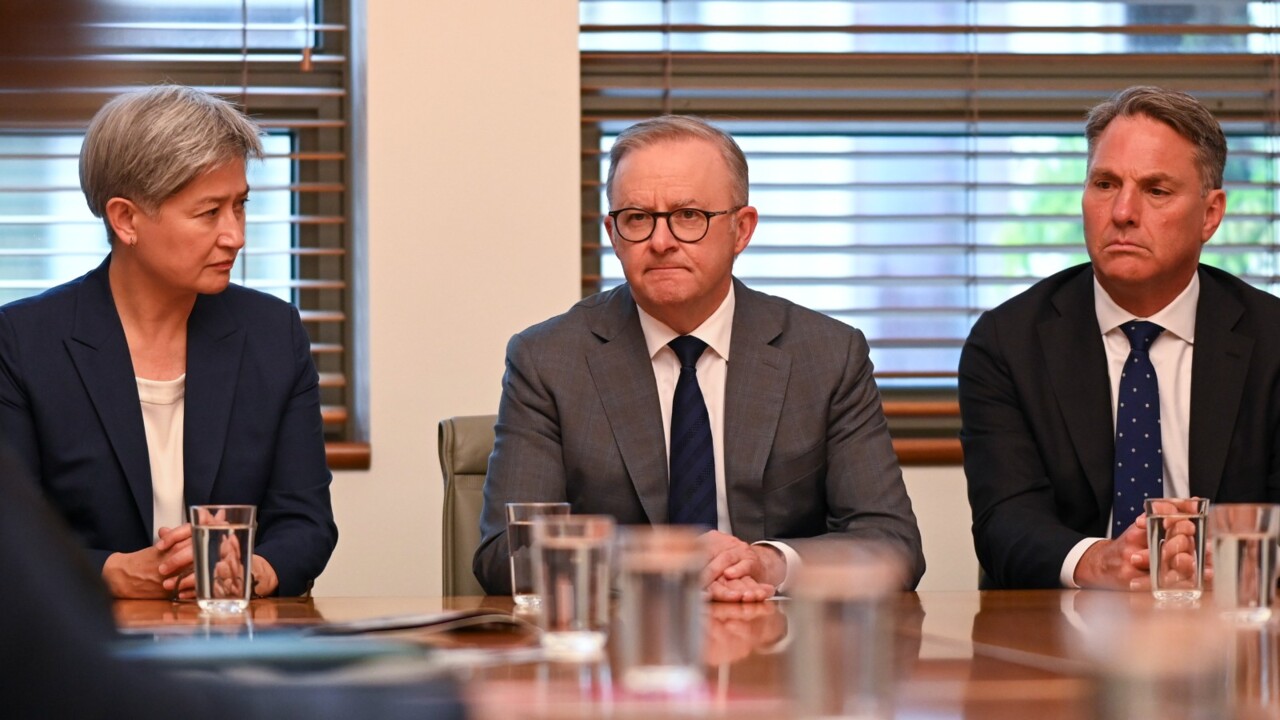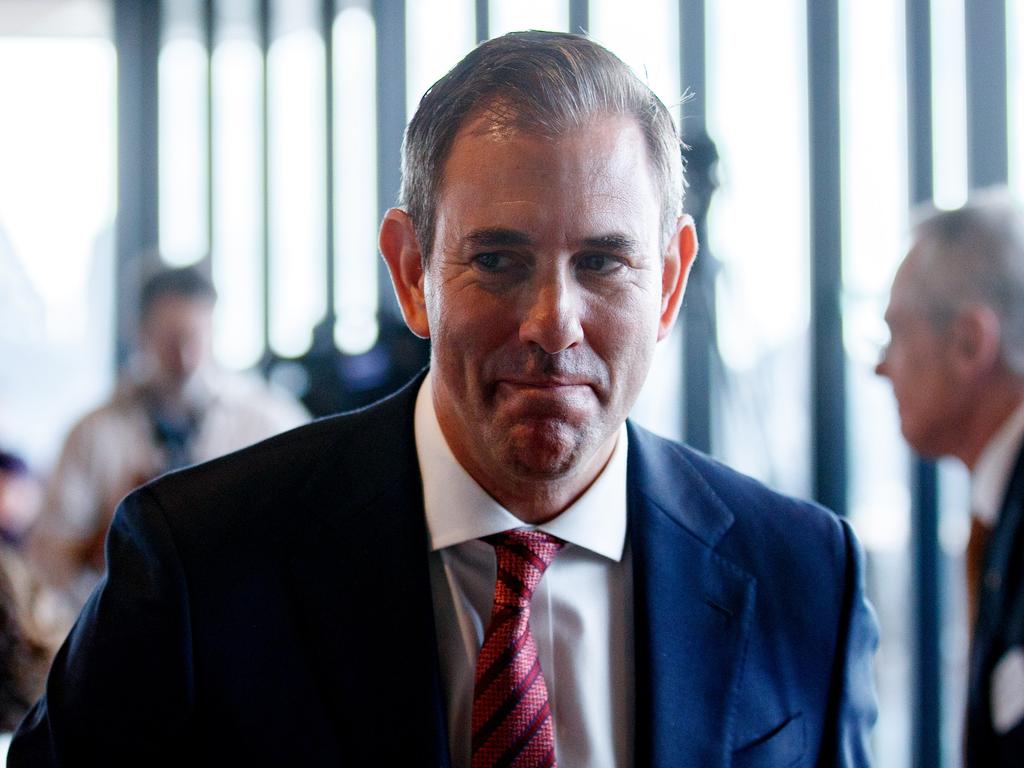Former Productivity Commission boss Gary Banks challenges Labor over Made in Australia agenda
The nation’s inaugural Productivity Commission chair, Gary Banks, has challenged Anthony Albanese’s view that his agenda does not constitute a return to old-fashioned protectionism.

Labor has embarked on a “fool’s errand” by embracing a new Made in Australia agenda, inaugural Productivity Commission chair Gary Banks has declared, challenging Anthony Albanese’s claim the flagship policy is an attempt to stay competitive in a transformed world and not simply a reversion to old-fashioned protectionism.
Professor Banks has also sounded the alarm on the death of proper policy development, condemning the emergence of a culture of secrecy and the use of non-disclosure agreements, as well as the growing politicisation of the public service, which he said constituted a “central challenge” to Westminster government.
In a broad-ranging paper delivered at a conference on Australia’s future challenges in Fremantle on Wednesday night, the National Disability Insurance Scheme, projected to cost $125bn within a decade, was subjected to special criticism for representing the “most wasteful use of resources”.
Professor Banks likened the scheme to the “Hotel California” from the famous song, saying many people entered the program “but few ever leave”.
Addressing the government’s Made in Australia agenda, Professor Banks warned that a new wave of subsidies for uncompetitive manufacturing firms would risk repeating the mistakes of the past. He said the policy was still geared around “manufacturing more in Australia and importing less”.
“While the PM and Treasurer have portrayed it as a new form of competition policy distinct from the ‘old protectionism’, the differences lie mainly in the instruments used and industries targeted,” he said.
“Import displacement is at the heart of both. Seeking to obtain benefits to society through subsidies for particular firms or industries, including in the form of tax concessions, has proven a fool’s errand, particularly where the competitive fundamentals are lacking.”
He said the risk of government sponsoring businesses that could not be internationally competitive would create a long-term dependence on public support while imposing significant costs on the community. Companies would be encouraged to maximise government sponsorship rather than lifting their performance. “It would seem from what information is available about this initiative that Australia is in danger of repeating the wrong history,” he said. “While it is asserted that, this time, the government’s approach will be ‘more nuanced and disciplined’, the basis for that is unclear, to say the least.”
Professor Banks hit out at the language used by the Prime Minister and Treasurer Jim Chalmers, declaring that novel theoretical concepts such as “values-based capitalism” or “new competition policy” were suddenly emerging “as if to lend an air of legitimacy to policy approaches hard to defend in more conventional terms.”
He warned that the government’s productivity agenda mainly amounted to a “spending more” agenda and was compounded by misguided policy approaches on energy and industrial relations.
He said the trend towards a “backroom approach to policymaking” was most concerning regarding efforts aimed at overhauling the EPBC Act.
“If there were ever an area of public policy in which inherent trade-offs necessitated fully transparent processes this would have to be it,” Professor Banks said. “Secrecy prevails to the point where any stakeholder lucky enough to be briefed about the government’s plans must sign a non-disclosure agreement. Such an approach has to date been largely confined to sensitive tax policy issues. It should have no place in cases like this.”
He lamented that advice from public servants was often provisional and not written down so it could be “adjusted to meet the wishes of a minister”. He pointed to the government’s claim its stage three tax cuts revamp was an idea that came from Treasury.
“The public service seems to have become politicised to the point where I no longer believe it can be relied on to provide objective advice in the public interest,” he said. “This poses a central challenge to the efficacy of our Westminster system.”
While both sides of politics had shown a lack of political will for real reform, devotion to “big government and an antipathy to market forces … plus surprisingly strong union influence” were proving “even more challenging under Labor”.
On Wednesday, Mr Albanese announced $400m in new loans to Australian company Alpha HPA for the nation’s first high-purity aluminium-processing facility in Gladstone. The project is expected to create about 490 jobs during construction and more than 200 jobs on completion.

It comes weeks after the government announced it would underwrite almost $1.1bn in loans and grants to build a rare earths mine and refinery in the Northern Territory and support a major West Australian lithium mine.
Speaking in Gladstone, Mr Albanese declared: “Nations around the world are reinvesting in their economic sovereignty, modernising their industrial base and embracing clean energy. This is the global race for a new generation of jobs and industries and opportunities. We can make our future here in Australia. This is a time of significant change.”
In his key “future made in Australia” address in Brisbane last Thursday, the Prime Minister said the role of government needed to “evolve”. He argued there was greater need for governments to make “economic interventions on the basis of national interest and national sovereignty”.
“We need to be willing to break with old orthodoxies and pull new levers to advance the national interest,” he said.
Dr Chalmers clarified on Wednesday that private sector investment would “continue to do most of the heavy lifting” and that “anything the government does will only ever be a tiny sliver of what’s needed”.
He said protectionism was “about building walls,” while Labor’s Made in Australia policy was “about building foundations”.
Professor Banks noted that manufacturing firms in Australia were already at a significant disadvantage because of the impacts of higher energy costs, which he dubbed a “self-made” emergency, and reduced flexibility in the labour market.
“It is therefore somewhat ironic that, having ignored or added to such impediments, the government is making a pitch for Australia to become a leader in ‘green manufacturing’,” he said. “Even more ironic is the recognition that this could only be achieved with substantial subsidies from the taxpayer and, in areas like solar panels, would be facilitated by ‘mechanised’ processes that minimise the need for labour.”
Last month, Mr Albanese announced a $1bn investment in production subsidies and grants to ensure more solar panels were built in Australia as part of the Solar Sunshot program.








To join the conversation, please log in. Don't have an account? Register
Join the conversation, you are commenting as Logout